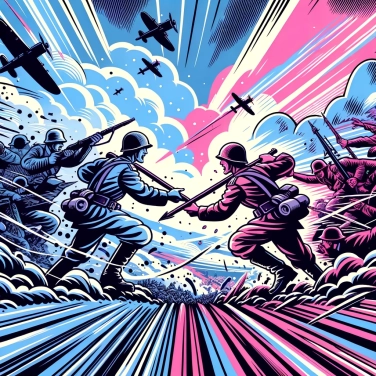The Battle of Stalingrad was a major turning point in World War II as the defeat of the German army led to significant material and human losses, thereby weakening the Nazi war effort on the Eastern Front and marking the beginning of the end of German expansion in Europe.

The Battle of Stalingrad was somewhat the decisive confrontation where everything was at stake for both Hitler and Stalin. For the Germans, capturing Stalingrad was an essential step in their overall strategy towards the East: controlling this city would have allowed them to take control of key trade and oil routes in the southern USSR — notably the vast oil fields of the Caucasus. This meant more resources, more power, further, faster. On the other hand, for the Soviets, defending Stalingrad at all costs represented not only the preservation of a major industrial city on the Volga, a vital communication route, but also symbolically, not yielding a city that literally bore the name of their leader, Stalin. From a geopolitical standpoint, it was a massive showdown where victory or defeat would directly determine the balance of power between the Axis and the Allies in Europe and even beyond. Everything hinged on just a few square kilometers of ruins and dust.
In Stalingrad, urban combat completely disrupted traditional tactics. It was a battle fought street by street, building by building, with snipers lurking everywhere. Each building became a mini fortress, with each floor being captured after violent close-quarters fighting, sometimes even with melee weapons. Soldiers lost all sense of direction: no clear lines, just the constant chaos in a backdrop of dusty ruins. Heavy artillery and tanks, normally masters of the open plains, were much less effective in these confined environments. As a result, everything depended on infantry combat, individual courage, and endurance. The sewers and basements played a key role, allowing Soviet troops to move discreetly to launch surprise counterattacks. This exhausting kind of urban warfare slowly but surely wore down the German army, which was used to easy and rapid advances.
The defeat at Stalingrad was a terrible shock for the German troops, who had been accustomed to a string of quick victories until then. This battle branded their morale with a hot iron, definitively breaking the myth of German invincibility. For the Allies, especially on the Soviet side, it was the complete opposite: regaining Stalingrad boosted their confidence and provided a tremendous psychological boost. For the first time, the Axis soldiers clearly understood that they could lose, and the Allied troops began to seriously believe in their victory. Stalingrad became the symbol of heroic resistance for the Soviet camp, and a lasting trauma for the Germans, who were starting to deeply doubt their military leaders, especially Hitler himself.
The Soviet Union paid a huge price at Stalingrad. We're talking about approximately one million Soviet soldiers killed or wounded. It was such an intense conflict that reinforcements were constantly arriving on site with no real possibility of rest or reorganization. Material resources were also used without restraint: tanks, planes, weapons, everything was sacrificed to block the Germans. This crazy determination to hold on completely exhausted the German military machine. As a result, it was thanks to all these Soviet sacrifices that the war took a decisive turn towards the final defeat of Nazi Germany.
The crushing defeat of the Germans at Stalingrad completely changed the global situation. Before that, some countries hesitated to truly choose their side. After the German rout, it became clear: the Allies had regained the initiative, and neutral or undecided nations began to seriously lean towards the Allied side. Turkey, for example, halted its friendly exchanges with Germany, and even Franco in Spain distanced himself from Hitler. The image of the Nazis, who had been seen as almost invincible until then, took a significant hit, leaving Germany isolated on the international stage and strengthening the determination of the Allies. For their part, Churchill and Roosevelt realized they could count on the USSR to weaken Germany, thus consolidating their alliance with Stalin and redrawing the balance of power internationally for the remainder of the conflict.
During the Battle of Stalingrad, the German army was losing an average of one battalion per day, illustrating the intensity and unprecedented scale of the urban combat fought in this strategic city.
Soviet snipers, like Vasily Zaitsev, significantly impacted the Battle of Stalingrad by creating a constant atmosphere of fear among German soldiers, which had major psychological consequences on their morale and combat effectiveness.
The freezing winter in Stalingrad was particularly decisive: at times, temperatures dropped to -30 degrees Celsius, causing more human losses on the German side due to the cold, hunger, and illness than from the direct combat itself.
Soviet women played a crucial role during the battle, serving as pilots, nurses, and even ground fighters, thereby demonstrating the significance of their contribution to the Soviet Union's war effort.
The Soviet victory at Stalingrad had a tremendous global impact by reigniting the hopes of the Allies. This encouraged increased mobilization in support of the Allies, redefined their military strategies, and facilitated the strengthening of relations and military coordination between the Western Allies and the Soviet Union.
Several factors contributed to the German defeat: a fierce and unexpected resistance from the Soviet army and civilians, extreme winter conditions for which the German troops were unprepared, logistical difficulties in supply, and finally the Soviet strategic encirclement known as Operation Uranus, which trapped the German forces in the city.
The Battle of Stalingrad is considered one of the deadliest in history, with about two million dead, wounded, or missing from both sides, along with immense losses in military equipment and the near-total destruction of the city of Stalingrad itself.
Stalingrad became an immense symbolic victory. After this grueling battle, the resistance and the ability to repel the fascist invader became crucial factors in boosting the morale of the troops and restoring the confidence of the peoples of the Soviet Union in the final victory.
Stalingrad represented a major political symbol, bearing the name of the Soviet leader Joseph Stalin. Its capture would have had a tremendous symbolic and moral impact, while providing Germany with a decisive strategic advantage by controlling the crucial routes leading to the oil-rich Caucasus.

50% of respondents passed this quiz completely!
Question 1/5